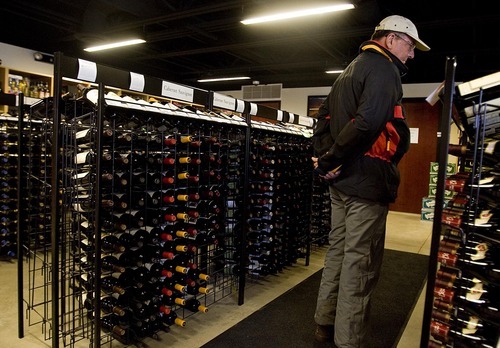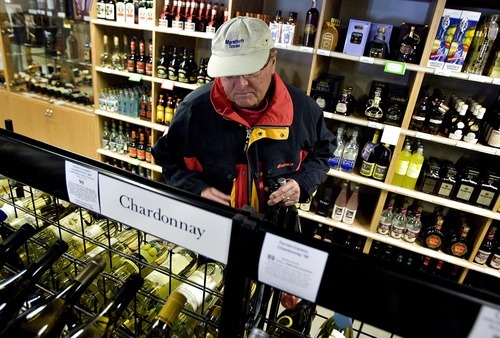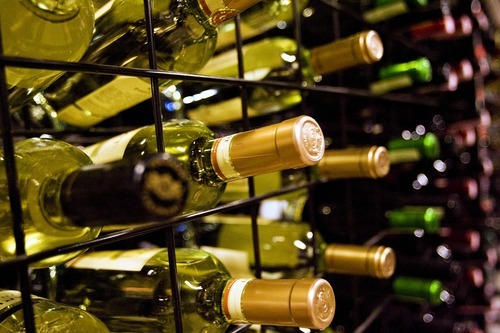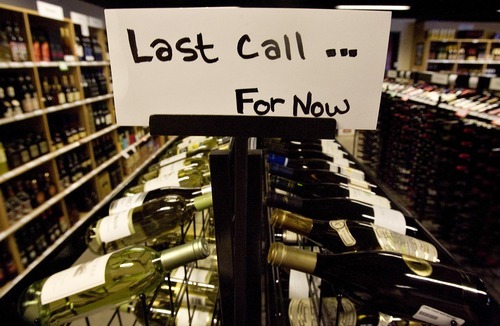This is an archived article that was published on sltrib.com in 2011, and information in the article may be outdated. It is provided only for personal research purposes and may not be reprinted.
If the Utah Alcoholic Beverage Control Commission agrees to close eight or nine state liquor outlets by July 1, the move will only widen an already huge gap in the number of outlets per Utah residents, compared with seven other states where liquor is sold through state-controlled stores.
Already in Utah, each state-owned outlet serves 17,648 residents, compared with one outlet per 1,118 residents in Washington, the state with the next-highest ratio, according to the National Alcohol Beverage Control Association.
The Utah liquor commission meets Thursday to discuss planned closures of outlets from the Foothills area of Salt Lake City to St. George and in between, plus an already approved store closure at 1457 S. Main St. in Salt Lake City. Commissioners also will discuss shorter hours at other stores.
Critics argue the changes at best will inconvenience Utahns at a time when alcoholic beverage consumption is growing.
At worst, they worry that the actions represent the end of a brief period of less-restrictive liquor laws in the state and a new volley in the battle between those who want the laws liberalized and those who don't for religious or other reasons.
"One can only assume that the Mormon theology of legislators is pulling the strings on this issue," Kaye Adams said in a Tribune letter to the editor. "Regardless, a lot of grown-up, responsible adults drink alcohol."
The recommended store closures and shortened hours stem from lawmakers' decision to cut the Department of Alcoholic Beverage Control's budget by 7.5 percent, or $2.2 million, more than most other state agencies.
The cut is expected to cost about 150 employees their jobs.
The cuts come even though the DABC is a moneymaker, adding more than $100 million to state and local treasuries each year, according to agency and state records.
Some argue that lawmakers' directive to close profitable stores — each of those on the closure list makes at least $1 million annually — suggests the state should no longer be allowed to hold a liquor monopoly.
A competitive market would best determine which stores should close, whether hours should be cut and how many employees should be laid off, said Randy Simmons, a Utah State University political science professor and chairman of the State Privatization Board.
But lawmakers decided to proceed despite that argument. The 2011 Legislature also banned discount happy hour drinks and ignored auditors' recommendations to ease quotas that would have created more bar and eatery permits.
They did transform 40 beer bar licenses to restaurant permits under SB314. But lawmakers left untouched fine dining and bar permits, which are in such short supply that none is likely to become available for a year — putting Salt Lake City's plans for neighborhood clubs on hold.
Legislation also was passed that strips the commission of the right to elect its chairman, making the position an appointee of the governor instead. And last year, a law went into effect mandating that restaurants must build separate rooms to hide bartenders from public view.
The retrenchment comes less than three years after then-Gov. Jon Huntsman Jr. successfully pushed to liberalize laws, allowing stronger drinks to be served and abolishing the state's one-of-a-kind private club memberships.
Sen. Jerry Stevenson, R-Layton, said business, not religious principles, led to lawmakers' mandate that liquor outlets close.
"There's been a stir on why we would want to close a store that makes a profit, but we felt that in a monopoly we could save on expenses and still make a profit by consolidating some stores," he said. "There could be a bit of customer inconvenience for those who have to go down the street a ways, but we based our decisions on good business principles in reducing the state budget."
Sen. John Valentine, R-Orem, said liquor-control commissioners, not lawmakers, must decide which stores are to close. He voted for the budget bill that mandated the cuts but believes the Provo and Orem stores should not close because the closures would leave the state's third- and fifth-most populous cities, respectively, without liquor outlets.
Legislative auditors, however, singled out the Orem and Provo locations for shuttering in a report that Valentine and many other lawmakers cited as justification for liquor department cuts.
Mayors whose cities would lose outlets are concerned.
Closing Park City's Swede Alley store would harm efforts to boost tourism, Mayor Dana Williams said. The store is so critical that the city built the building where it is housed and charges $600 rent in an area where landlords charge $4,000 for comparable space.
Orem Mayor Jerry Washburn said his city stands to lose between $30,000 and $35,000 in taxes, "and any loss of revenue in real tight times is a concern." The store rings up annual sales of $3.7 million and puts $1.7 million in local and state treasuries annually.
Provo Mayor John Curtis said he's sympathetic that the Legislature must cut its budget "and sometimes when you don't have a choice, you're put in a position of making decisions that defy logic. I would hope the Legislature would watch the situation carefully and be ready to reinstate the store if there's a revenue loss to the state." If the store closes, however, the property probably would be put up for sale.
Sam Granato, Alcoholic Beverage Control Commission chairman, has fought lawmakers' efforts to close profitable stores. He believes his stance makes it unlikely he will be reappointed to the commission when his term ends on June 30 now that the governor gets to appoint the commission's chairman.









